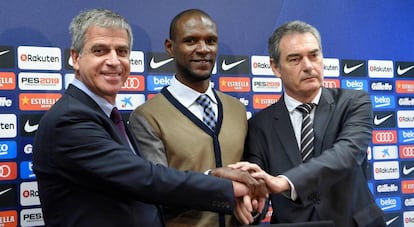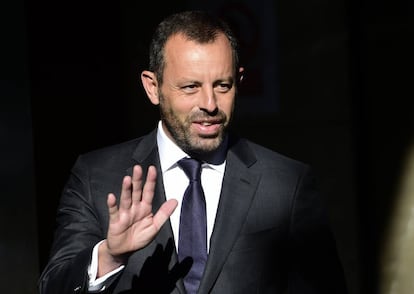Could Barcelona soccer club have illegally purchased a liver for a player?
A probe has been opened after wiretaps of former Barça president Sandro Rosell suggest donor for Éric Abidal was not his cousin, as had been claimed, and that the organ was paid for

Spain’s National Transplant Organization (ONT) and the Clínic Hospital in Barcelona have opened an internal investigation related to the donation of a liver to the former Barcelona soccer club player Éric Abidal in 2012. The donation, the two organizations have stated, was carried out “in accordance with current legislation and the usual clinical protocols” related to live donors. The probe comes in the wake of news that broke this week about Civil Guard phone taps of the former Barcelona president Sandro Rosell, which suggest that the organ may have been illegally purchased by the club.
Rosell has been in pre-trial custody for over a year, ahead of his trial for money laundering and criminal organization offenses related to funds allegedly siphoned off from the Confederation of Brazilian Football and the broadcast rights of the national team’s games, as well as money from the sponsorship deal the team had with sports clothing giant Nike.
In April of this year, a court in Barcelona shelved a case investigating the possible illegal purchase of a liver for Éric Abidal, who is now the club’s technical secretary. As revealed by Spanish news website El Confidencial, three of Rosell’s phone calls tapped by the Spanish authorities put into doubt whether the donor was Abidal’s cousin, as the then-player had stated, and suggested that the organ was instead bought. Abidal had been diagnosed with a cancerous tumor at the time.

The court was given the case by Spain’s High Court, the Audiencia Nacional, which had declined jurisdiction. The Barcelona tribunal sent letters rogatory to France in order to determine whether the donor had received payment or not, and to clarify the circumstances of the process. The French authorities replied that the French criminal code on the sale of organs was not the same as that in Spain, and sent no information on the matter, which prompted the court to shelve the investigation without taking further action, according to judicial sources consulted by EL PAÍS.
According to police sources, the court had evidence that the organ had been purchased irregularly as far back as a year ago. Until now, the investigations carried out by the Civil Guard consisted of identifying the liver donor and relaying that information to the judge.
In the recordings made by the Civil Guard, Rosell is talking to someone referred to as “Juanjo,” who is recorded complaining about the attitude of Abidal toward the club’s board. “He’s going against us,” the man says on the tape. “We bought an illegal liver for this guy.” Rosell is heard to agree. Junajo adds: “And we sold the story that it was from his cousin. From his cousin!” Again, Rosell agrees, saying “Yes, yes, yes.” In total there were three calls that pointed to an alleged fraud related to the transplant.
Police say there was evidence the organ had been purchased irregularly as far back as a year ago
In a statement released to the press, Rosell’s lawyers have stated that they “have no knowledge of the facts,” adding that it seems “a little strange to think that an illegal liver could be purchased and transplanted in a public hospital.” A strict series of controls is in place for transplant procedures in Spain, including ensuring that the donor is offering the organ for altruistic purposes and not for financial gain.
EL PAÍS has been able to confirm that these conversations did take place, and can be characterized as heated discussions referring to the irritation of Rosell after Abidal accused the club of not wanting to renew his contract after he recovered from the operation, and also of not being paid while he was on medical leave recovering.
The accusations of the player were cleared up months later, when a joint statement was released by the club and the player stating: “Both parties confirm that the club has complied with the contractual commitments that it had signed with the French player.”
For now, FC Barcelona is yet to offer an official account of the facts, but sources have so far said that there were no irregularities related to the ex-player’s surgery. Three years after the operation, Abidal’s partner tweeted out a photo of the ex-player with his son and the supposed organ donor, Abidal’s cousin.
Both the Clínic Hospital in Barcelona, where the surgery took place, and the Catalan regional health department, have stated that all of the documents that were required for the transplant from a living donor were in place.
English version by Simon Hunter.
Tu suscripción se está usando en otro dispositivo
¿Quieres añadir otro usuario a tu suscripción?
Si continúas leyendo en este dispositivo, no se podrá leer en el otro.
FlechaTu suscripción se está usando en otro dispositivo y solo puedes acceder a EL PAÍS desde un dispositivo a la vez.
Si quieres compartir tu cuenta, cambia tu suscripción a la modalidad Premium, así podrás añadir otro usuario. Cada uno accederá con su propia cuenta de email, lo que os permitirá personalizar vuestra experiencia en EL PAÍS.
¿Tienes una suscripción de empresa? Accede aquí para contratar más cuentas.
En el caso de no saber quién está usando tu cuenta, te recomendamos cambiar tu contraseña aquí.
Si decides continuar compartiendo tu cuenta, este mensaje se mostrará en tu dispositivo y en el de la otra persona que está usando tu cuenta de forma indefinida, afectando a tu experiencia de lectura. Puedes consultar aquí los términos y condiciones de la suscripción digital.








































